- Home
- Antonia Fraser
Cromwell Page 26
Cromwell Read online
Page 26
Meanwhile on the King’s ruined side, there was precious little exhilaration to match such heights of enthusiasm. “What should the King do?” demanded Clarendon rhetorically, with his wife in France, his eldest son in the Scilly Isles, scarcely a General left, and in any case hardly any troops for a General to lead, had one existed.43 For some time Charles had, among other ploys, been negotiating secretly with the Scots through the offices of the French Ambassador. Finally he decided that this was where his destiny lay, and fleeing from Oxford on 27 April, reached the refuge of the Scottish Army at Newark on 5 May. Oxford itself however still remained untaken, and it was to the environs of Oxford that Cromwell was now despatched, at Fairfax’s orders, with a view to breaking it by siege. It was therefore at Oxford on 15 June, at the house of Lady Whorwood at Holton, which is believed to have been Cromwell’s headquarters, that the nuptials of Henry Ireton and Bridget Cromwell were finally performed.
They were now thirty-two and nearly twenty-two respectively and were indeed well-matched in their conscientious natures. Bridget was a shy rather homely Puritan maid. Despite pretty chestnut-coloured hair, she had the family characteristic of a long nose set in a long face, and the heavylidded eyes she derived from her father were somehow too masculine a characteristic to be assimilated easily into feminine prettiness. Bridget’s prime interest seems to have been, suitably enough for Henry Ireton, the state of her own soul: even Lucy Hutchinson allowed her “piety and humility” and singled her out as having less arrogance than the rest of her family. As a correspondent wrote to Cromwell of Bridget in Ireland, she was certainly a woman “breathing after Christ”. Nevertheless Cromwell worried over his “dear Biddy”. In later life he even felt compelled to admonish her kindly to be more cheerful, to avoid “a bondage spirit”. He told her to rely more on love than on fear: compare “the voice of fear (if I had done this, if I had avoided that, how well it had been with me)” with the voice of love which exclaims more confidently: “What a Christ have I, what a Father in and through Him! ... He is Love – free in it, unchangeable, infinite.”44 But perhaps in the grave Ireton, Bridget found sympathy for her religious scrupulosity and, since he was considerably older than she was, some sort of substitute for the dependence she evidently felt on her father.
The course of their true love ran smooth, if it was not altogether free from worries on Bridget’s side. A few months later, Cromwell was writing to his daughter in gently teasing terms, apologizing for not addressing his letter to the head of the family (Ireton): it was partly to avoid trouble since “one line of mine begets many of his, which I [have no] doubt makes him sit up too late”. At the same time he reassured the anxious Bridget on some scruple which she had put to him concerning the comparative natures of married and divine love. In the joyful mission after self-fulfilment in Christ, a husband should only prove an encouragement: “Dear Heart, press on; let no husband, let not anything cool thy affections after Christ. I hope he will be an occasion to inflame them. That which is best worthy of love in thy husband is that of the image of Christ which he bears.”45 It was certainly more suitable advice to give Bridget Ireton than Bettie Claypole. The wedding was performed by Fairfax’s chaplain Dell, and the couple received the lease of a farm in Ely as part of Bridget’s jointure. It seemed likely that Ireton would soon have the enjoyment of it. There was no surer sign that the war was really drawing to a close than that those two dedicated soldiers, Ireton and Cromwell, had at long last proposed and consented to the sealing of this knot.
Oxford offered surrender on 20 June, and on 24 June the garrison marched out. The terms, as at Exeter, were generous and once again Cromwell’s army commission – renewed for six months in January running out, it was time for Cromwell himself, and indeed the whole country of England, to look forward thankfully to a life of peace once more.
8 Falling out among themselves
You have done your work, and may go to play, unless you will fall out among yourselves.
LORD ASTLEY ON BEING CAPTURED BY PARLIAMENT IN 1646.
The twelve months that stretched forward from the summer of 1646 constitute one of those watershed periods of English history from which many rivers flow. In the life story of Oliver Cromwell it began with an outward decline into the obscurity of civilian life in contrast to the military glories of the last four years. One of Oliver’s first gestures towards his altered status was to bring his family up from Ely to London. Deserting the spacious street of Long Acre (in the course of his sojourn there his cost of living had risen, his rating for the poor ascending from IDS. to 143.), he acquired a house in near-by Drury Lane. The precise site is unknown, but it was certainly close to the famous Red Lion Inn of Holborn which played much part in the annals of the time. Holborn was at the time the most respectable residential neighbourhood for a man of Cromwell’s station, a recent building development linking City and Westminster. And for family life, it had something of the appearance of a garden city: country flowers still grew in profusion as John Gerard had noted in his Herball a generation earlier. The great English taste for gardening, observed in this period by the Puritan philosopher Samuel Hartlib, ensured that nature was still further enriched by art: in London gardens grew freely the Musk, the Blush and the Damask Rose, peonies and even gooseberries for the more enthusiastic. Vines flourished in Leicester fields; there were great elms in the gardens of the Inns of Court, and roundabout in Holborn, mulberries, figs, horse-chestnuts and morello cherries.1
Oliver was now, in theory at least, a man of some substance in possession of a handsome income assigned to him by a grateful Parliament. But in practice there were many delays in the granting (by the spring of 1648 he said that he had received only a total of Ł1,680) which may account for the anomalous continued presence of Cromwell’s name in the pay-books of the New Model Army despite his official disbandment in July. Recent research has brought to light various payments authorized by Fairfax, including one on 23 November to Cromwell as Lieutenant-General of the horse for one hundred and twenty days’ pay; on 2 December Cromwell even received the unusually large advance of 500 “being so much Money upon account to be abated out of my next Pay in the Army”.* ( * See Professor G. E. Aylmer Was Oliver Cromwell a Member of the Army in 1646-7 or not? who cites the appropriate references from the PRO Commonwealth Exchequer Papers, Army Committee, Warrants SP 28/41.)Yet his commission had duly run out in July and, for all that he continued to bear the honorific title of Lieutenant-General, was not renewed. Under the circumstances his inclusion within the administrative framework of the Army for pay purposes probably helped to gloss over Parliament’s deficiency. Strange legends spring up round the Cromwell name. He is said, for instance, to have built Cromwell House, Highgate (now part of a hospital) and presented it to Bridget on her marriage. But Cromwell in 1646 would hardly have been in a position to indulge in such a scheme, nor did he do so.2 At the end of 1647 he moved the Cromwell family again, to King Street, Westminster, just by the modern Parliament Square. It is a point now eliminated by the widening of Parliament Street and covered by government offices, but then lying between Charles Street and Great George Street. It was obviously much closer to the House of Commons than Holborn and the move must be seen as a reflection of the growing intensity of Cromwell’s Parliamentary life.
London, rudely described by Thomas Hobbes as having “a great belly but no palate nor taste of right and wrong”, had at any rate shown sensibility enough in the recent conflict to take its own self-defence very seriously: fortifications, possibly part of a total circumvallation, and certainly including batteries at strategic points such as Tothill Fields and the present site of Buckingham Palace, then the Spring Gardens, were still to be seen in 1647; the modern name of Mount Street is said to have commemorated a huge lump of earth which formed part of these deployments.3 In other ways than the continued existence of now unnecessary bulwarks in a once peaceful and mercantile city, the state of London was confused. The enormous bewilderment of the multitude of the pe
ople of England during the Civil War was an obvious corollary of its regional character where big issues – whatever they might be – tended to be fought out by small battles between known local enemies. London was but a microcosm of the general unease, for with the peace had come no clearly defined return to the old values, or even the sort of recognizable continuity expressed in a royal Court. The poet Cleveland had expressed this melancholia, lamenting the lost graces of the vanished age in his poem of 1645, The General Eclipse:
Ladies that gild the glittering mom
And by reflection mend his ray …
What are you now the Queen’s away?
Puritanism was spreading across the city like a cold mist as a result of the various Parliamentary ordinances to disseminate it: Christmas came on the proscribed list as popish flummery and in 1646 the House of Commons dutifully sat through Christmas Day. The following spring the apprentices, finding themselves deprived of the many holidays implicit in the Church festivals, felt obliged to petition for substitutes in the shape of monthly ‘play-days’. London, in short, was full of malcontents of many sorts.
The lack of a Court only mirrored the lack of a King, a prisoner by his own choice in the hands of the Scots. It was almost ludicrous how little concerning his position had been settled by the past war – or the great rebellion as the King’s adherents preferred to term it. The political settlement remained to be furbished virtually from scratch, since nothing had emerged of any moment from the various attempts at peacemaking during its course: the exact rights of the King in relation to Parliament and of Parliament to the rest of the nation, were still to be analysed with as much fervour as if Marston and Naseby had never been fought. The first effort at filling this political vacuum occurred in July when the so-called Newcastle Propositions were presented to Charles, now held by the Scots in that town on the borders of Scotland and England. The propositions, which would have fairly clipped the royal wings by placing the control of the Army under Parliament for twenty years, and punishing his leading supporters, also served to underline the fact that once back at Westminster, it was very much the Presbyterians who enjoyed the Parliamentary majority. The religious clauses included not only the swearing of the covenant by the King and his subjects and the abolition of the episcopacy, but also the reformation of religion according to the wishes of Parliament in consultation with the Assembly of Divines at Westminster.
It was hardly a settlement which could have been palatable to Charles, even if he had felt himself to be in extremis. But the King, far from despairing, was ever mindful of the possibilities of dissension among his various opponents. Astley, on being taken prisoner on the way to Oxford, had told the Parliamentarians prophetically, “You have done your work, and may go to play, unless you will fall out among yourselves.” It was the latter expectation which continued to interest his sovereign. Nevertheless Charles did not see fit to reject the proposals out of hand: he gave what Cromwell described as a very general answer, seeking as always to conceal with outward prevarication a real inability to compromise. Cromwell himself, having taken no part in the negotiations, showed that at the same period his Independent sympathies for toleration remained unabated. He intervened with one of his friendly appeals on behalf of some poor inhabitants of Hapton, south of Norwich over “the trouble I hear they are like to suffer for their consciences. And however the world interprets it”, he wrote, “I am not ashamed to solicit for such as are anywhere under a pressure of this kind; doing therein as I would be done by .. .”4
But such petty kindnesses were small change for the man who had been hailed as Parliament’s most glorious General: as the Presbyterians in the Commons pressed home their own views, Oliver’s mood sank by degrees into a depression very different from the triumphant exaltation of the military campaigns. By August he was writing to his old commander Fairfax at Bath, back after reducing Raglan Castle, with real despair: “Things are not well in Scotland; would they were in England! We are full of faction and worse.”5 Indeed Cromwell’s gloomy analysis of the two kingdoms could hardly be gainsaid in the summer of 1646, and for good measure he might well have thrown in Charles’s third dominion, Ireland. The position of the Scots was perhaps the simplest of the three: they still held the King prisoner inside England, but basically they wished to be paid off for their services and return home. Of the English, although there was general agreement that the disappearance northwards of these turbulent allies was highly desirable, the Presbyterians viewed the Scots from the angle of potential allies, the Independents from the opposite vantage of possible opponents. Meanwhile the long bubbling volcano of Ireland was showing signs of overflowing, in which case it would react on the English political situation once more in earnest.
During the prosecution of the Civil “War neither King nor Parliament had shown much sign of concentrating on their respective Irish campaigns: the King had wanted peace in Ireland to beat Parliament, and Parliament peace to beat the King. But the existence of three other rogue armies within the island had successfully ensured that peace was the last thing anyone in Ireland enjoyed. By the summer of 1646 the five forces all rampant in Irish territory included that of the Earl of Ormonde, King Charles’s Protestant General, head of the great Anglo-Norman family of Butler, with vast estates in Kilkenny, a man of prodigious energy whose flaxen hair had earned him the sobriquet of James the White; looking at his portrait later Cromwell noted approvingly that he looked more like a huntsman than a soldier.6 Ormonde, whose natural qualities made his leadership one of the King’s most promising assets in Ireland, had managed to effect a tenuous link with a second army interested temporarily in a Royal victory – that of the Irish Catholic confederates under their own equally colourful leader, Owen Roe O’Neill. The Irish Catholics sported a heroic motto: “Ireland united for God, King and Country”, but were themselves checkered with internal disagreements. The third army was equally Catholic, that of the Papal legate Cardinal Rinuccini, armed with Roman gold, but much less inclined to be friendly to Ormonde, being more interested in the restoration of Catholicism than that of the King. The fourth and fifth armies were both Protestant: there was that of the Scots under Munro, defeated by Ormonde in June at the battle of Benburb; lastly there still existed the official Parliamentary army under Sir Charles Coote.
Ormonde managed to conclude a peace with the confederate Irish at the end of 1646, but the Cardinal, a man of much Italian subtlety but little understanding of Irish affairs, upset the union by seeing to it that the orders of King Charles’s Lord-Lieutenant received a ban from the clergy.7 It was at this point that Ormonde, fearing to lose Ireland altogether to the Catholic Irish now showing themselves so obdurate, and knowing that the King was in no position to help him, appealed to Parliament for aid. His request met with sympathy from the Independents who were quite willing that some regiments of the New Model should be sent to Ireland. In the vote as to whether the matter should be referred to a committee Cromwell, showing his habitual interest in Irish matters, acted as teller for the Yeas. Holies and Stapleton, those zestful representatives of the Presbyterian faction, told for the Noes. But the Independents, as happened not infrequently in this autumn of their discontent, lost: there was to be no Ireland for the New Model, instead quite a different force, raised separately, was to be despatched. England’s finest fighting machine was to continue to cool its heels while a job which both emotionally and militarily would have well suited its proclivities, went elsewhere to an army not even in existence. It was no wonder that Cromwell wrote to Fairfax in a thunderous mood.
The death of the Earl of Essex in September did something to lift up the spirits of the Independents, because it robbed the Presbyterians of an estimable figurehead who stood for much in the popular mind. Despite his magnificent funeral in Westminster Abbey and a noble peroration by a Presbyterian minister, the solemnity of the occasion was not allowed to go undisturbed by the dissident spirits of London. During the night Essex’s wax funeral effigy, dressed up in the buff
coat and scarlet breeches which he had worn at Edgehill, was slashed and cut; the sword was removed.8 But in general the autumn for Oliver was a period of much Parliamentary activity, with only a few Independent triumphs to show for it. The affair of the Parliamentary Great Seal was one of them: the custody of the seal symbolized, in effect, the whole question of the supremacy of King or Commons. Cromwell and Vane wanted it placed in the custody of both Houses; when the two speakers were finally given authority to act as commissioners, their point was won.
In December an accommodation concerning the King and their own retreat homewards was finally reached with the Scots, and an official Agreement signed on the 23rd. Cromwell’s name came ninth on the list of the thirteen English signatures, between that of Haselrig and Stapleton: Sir Henry Vane’s name was conspicuous by its absence. Cromwell himself broke the news to Fairfax two days previously, taking the opportunity at the same time to describe the general malaiseof the City towards theArmy.9 A sum of .Ł400,000 was to be paid to the Scots, in return for which the northern armies would withdraw. Implicit in the arrangement – although nowhere mentioned in its text – was the handing over of the King to Parliament, and for his renewed incarceration at altered hands proceedings were now set in train. After some discussion, it was decided that Holdenby Hall in Northamptonshire was the most suitable locality. To this weird pile, with its numerous and fantastic embellishments of turrets like chimneys, built by Queen Elizabeth’s favourite, Christopher Hatton, the King was brought on 16 February 1647.
The decision was not universally approved. At Newcastle, the people shouted taunts at the departing Scots soldiers and told them they were nothing but Jews, because they had sold their King and their honour; the English officers had to restrain the women of the town from throwing stones. Nevertheless the disappearance of the Scots, for all that the end of the previous year had seen a slight amelioration in Independent fortunes, meant that the helm was now right back in the hands of the Presbyterians. To those amongst them who combined optimism with determination and they were not a few – there seemed only one remaining block in the path of a proper Presbyterian settlement of England, and that was the disbandment of the New Model Army. The obvious and, as it seemed to them, almost the happy solution, was to persuade the disbanded Independents to betake themselves to Ireland in a new form. Here, since early in the New Year, Ormonde had abandoned his hopeless plans to conciliate Catholic Papal Nuncio and Protestant English Parliament. In a letter of 20 February he finally offered to resign his Lord-Lieutenantship, received from the King, to Parliament on no conditions except his own safety. The war in Ireland was now fairly and squarely the responsibility of Parliament, but fortunately the appropriate instrument of conquest seemed to lie within their own hands.

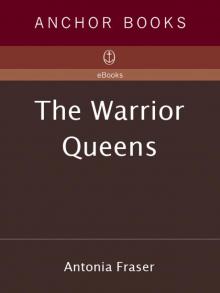 Warrior Queens
Warrior Queens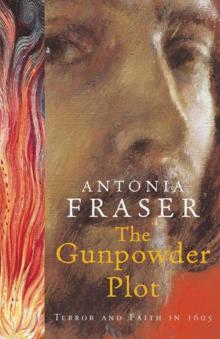 The Gunpowder Plot
The Gunpowder Plot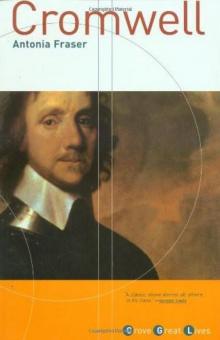 Cromwell
Cromwell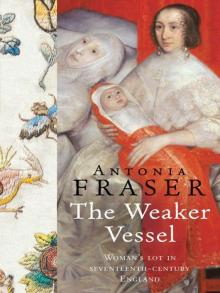 The Weaker Vessel: Women's Lot in Seventeenth-Century England
The Weaker Vessel: Women's Lot in Seventeenth-Century England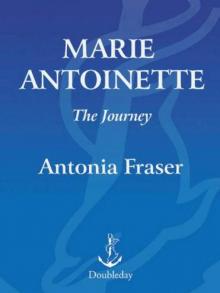 Marie Antoinette: The Journey
Marie Antoinette: The Journey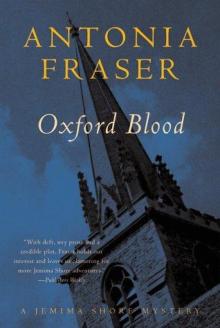 Oxford Blood
Oxford Blood Your Royal Hostage
Your Royal Hostage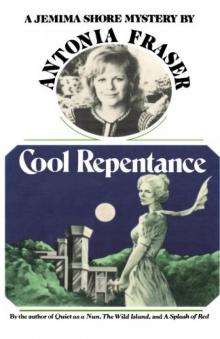 Cool Repentance
Cool Repentance Mary Queen of Scots
Mary Queen of Scots Political Death
Political Death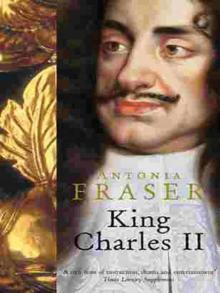 Royal Charles: Charles II and the Restoration
Royal Charles: Charles II and the Restoration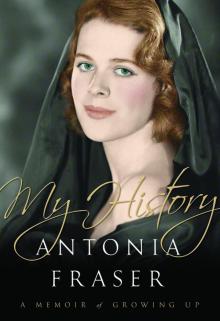 My History: A Memoir of Growing Up
My History: A Memoir of Growing Up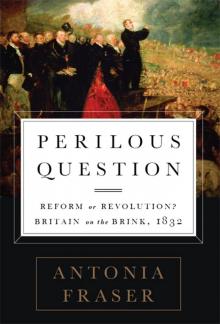 Perilous Question: Reform or Revolution? Britain on the Brink, 1832
Perilous Question: Reform or Revolution? Britain on the Brink, 1832 Jemima Shore at the Sunny Grave
Jemima Shore at the Sunny Grave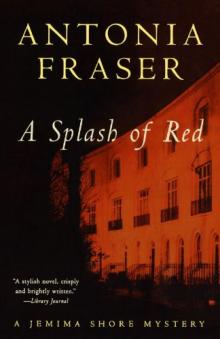 A Splash of Red
A Splash of Red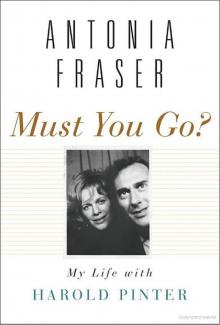 Must You Go?: My Life With Harold Pinter
Must You Go?: My Life With Harold Pinter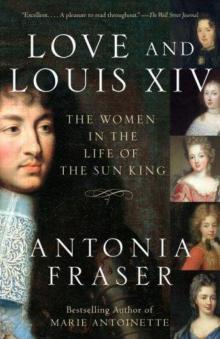 Love and Louis XIV: The Women in the Life of the Sun King
Love and Louis XIV: The Women in the Life of the Sun King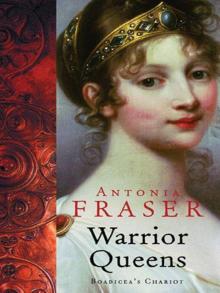 The Warrior Queens
The Warrior Queens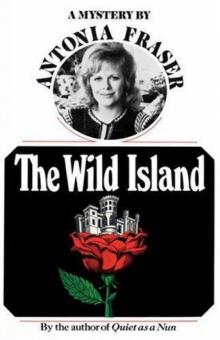 The Wild Island
The Wild Island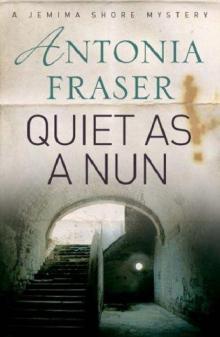 Quiet as a Nun
Quiet as a Nun Perilous Question
Perilous Question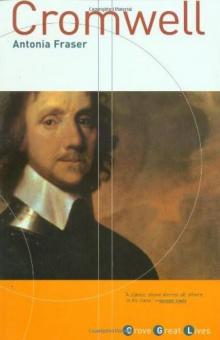 Cromwell, the Lord Protector
Cromwell, the Lord Protector Gunpowder Plots
Gunpowder Plots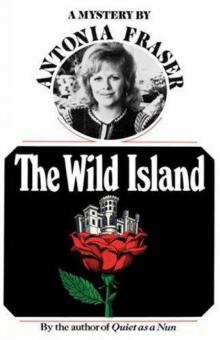 The Wild Island - Jemima Shore 02
The Wild Island - Jemima Shore 02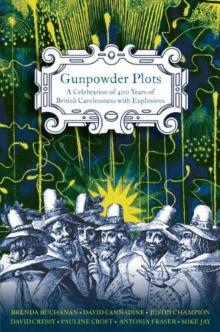 Gunpowder Plots: A Celebration of 400 Years of Bonfire Night
Gunpowder Plots: A Celebration of 400 Years of Bonfire Night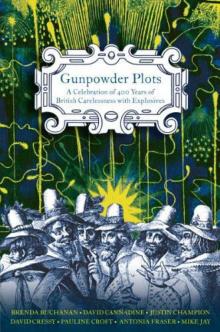 Gunpowder Plots_A Celebration of 400 Years of Bonfire Night
Gunpowder Plots_A Celebration of 400 Years of Bonfire Night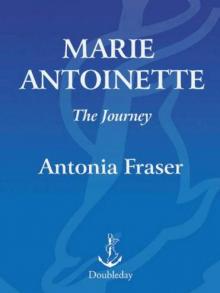 Marie Antoinette
Marie Antoinette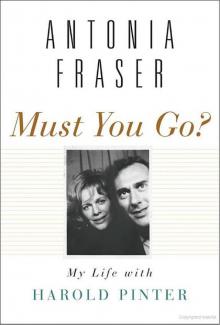 Must You Go?
Must You Go?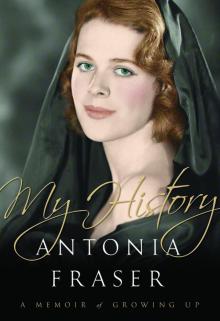 My History
My History